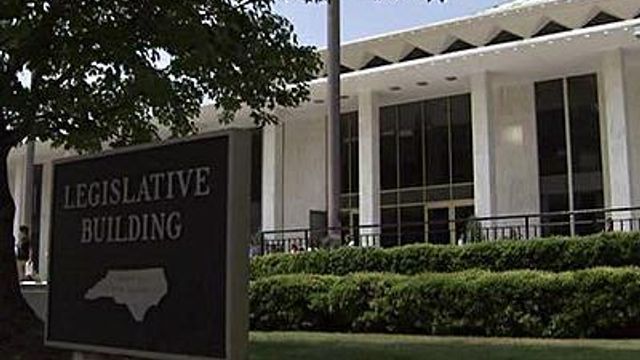House beats abortion rules veto, falls short on voter IDs
Legislation placing additional restrictions on abortions moved within one step of becoming law after the state House voted Tuesday to override Democratic Gov. Beverly Perdue's veto.
Meanwhile, the House failed in its effort to override Perdue's veto of legislation that would have required voters to present photo identification before casting their ballots.
The 67-52 vote was five votes short of the margin needed for an override, but House leaders said they might make another attempt in the future to get the voter ID legislation passed.
In a statement, Perdue thanked lawmakers who "stood firm in their belief that every North Carolinian has the constitutional right to vote and that the state should not be creating obstacles to stop them."
"We were hopeful that, following the governor’s veto, members from across the aisle would hear from their constituents and be willing to work with us on this very important issue," House Speaker Thom Tillis said in a statement. "While that didn’t happen today, I remain optimistic that we will accomplish meaningful voter reform in this legislature."
On the abortion override, the House voted 72-47 in favor of a bill requiring a woman to have an ultrasound of the fetus, consider an offer to see the shape and hear a heartbeat in her uterus, receive state-mandated counseling, and wait 24 hours before an abortion.
"The intent is to give women the information they need," said sponsor Rep. Ruth Samuelson, R-Mecklenburg. "Large numbers of women want this bill.”
The Senate must also approve a veto override by a three-fifths majority before the abortion regulations would become law. Republicans have more than enough votes to make that happen.
Perdue said she rejected the abortion restrictions as a needless government intrusion into what doctors tell women who have already made a difficult choice.
"The Republicans’ social agenda has, with this bill, invaded a woman’s life as never before – by marching straight into her doctor’s office and dictating the medical advice and treatment she receives," the governor said in a statement. "I remain opposed to this legislation."
North Carolina is one of 16 states that don't require specialized counseling before an abortion. Half of all states require counseling, then a waiting period.
The new restrictions would keep abortions legal and make them safer than before by requiring doctors and clinics to have insurance and backup plans, Samuelson said.
Abortions also would become rarer, she said, because "women have changed their minds" in other states where they already have some form of informed consent for abortions.
"What is so dangerous about information?" she said. "What are your alternatives? Are there social services available so the woman really has the whole picture of what her options are?"
Democrats argued the restrictions were less about safety and full information than the Republican majority serving the political priorities of its supporters.
"It's a sad day for the women of North Carolina," said Rep. Deborah Ross, D-Wake.
Rep. Alma Adams, D-Guilford, said the General Assembly would never pass a law that would place such restrictions on a procedure for men.
"I was created from the womb of my mother just like every person here, and my gender should not determine whether I or not I can make a decision what I could do with my body," Adams said.
"It's a place the state has no right to be, constitutionally or medically," said Rep. Rick Glazier, D-Cumberland.
Rep. Diane Parfitt, D-Cumberland, a nurse by profession, said the state already has informed consent laws in place for medical procedures.
The measure passed the House last month one vote short of enough to override a veto but with support from three Democrats who also sided with the GOP to pass the state budget over Perdue's veto.
Rep. Jim Crawford, D-Granville, who also sided with Republicans on the budget and other override votes this week, cast the deciding vote on the abortion bill. He switched his "no" vote from last month to a "yes" vote on Tuesday's override.
Anti-abortion activists sitting in the House gallery clapped after the vote was announced.
"I'm ready to celebrate and say, 'Hallelujah, Lord Jesus Christ. Amen," said Sarah Bergstron, an abortion opponent who drove from Fayetteville with three other families to watch the House session.
After the vote, Tillis, R-Mecklenburg, went outside the gallery to hug North Carolina Right to Life president Barbara Holt.
"The Woman’s Right to Know Act enables women to make a fully informed decision about whether or not to end a pregnancy, without restricting her freedom to make the final decision," he said in a statement. "I am proud of the bipartisan victory this override represents, and I am pleased that this common-sense law is on the books.”
Holt and others who had sought abortion restrictions for decades in North Carolina had tears in their eyes as they embraced each other knowing that a legislative victory was now just one step away.
"Oftentimes women regret their abortion because they have not received the information that's due to them," Holt said. North Carolinians "want mothers to have information. They understand that there are two lives."
The House also voted 72-47 to override a veto of legislation that would give businesses more latitude in denying jobless benefits to unemployed workers. Perdue said she vetoed the measure because the U.S. Department of Labor said provisions would violate federal law, but it now becomes state law because the Senate previously voted for the override.
“The leaders of the General Assembly like to portray themselves as business-friendly, yet they have shoved through a bill that will lead to tax increases on employers," Perdue said in a statement. "It could delay unemployment benefits for people who are entitled to them, and it will likely cost North Carolina millions of dollars that should go to unemployed North Carolinians and their families.”











